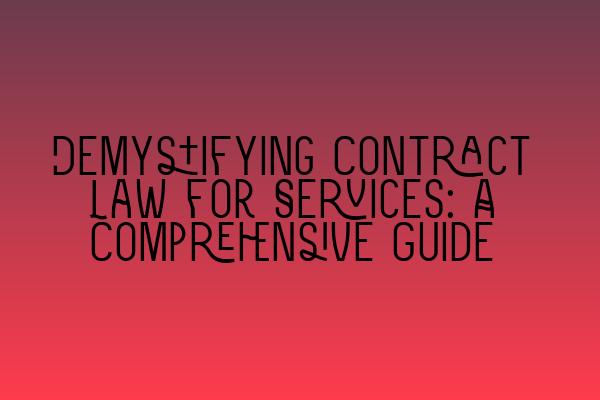Demystifying Contract Law for Services: A Comprehensive Guide
Contracts are an essential part of any business transaction involving services. Whether you are a service provider or a client seeking services, having a clear understanding of contract law is crucial to ensure that your rights and obligations are protected. In this comprehensive guide, we will demystify the complexities of contract law for services and provide you with the knowledge you need to navigate this legal landscape confidently.
The Basics of Contract Law
At its core, a contract is a legally binding agreement between two or more parties. It outlines the terms and conditions of the service to be provided, the duties and responsibilities of each party, and the remedies available in case of non-compliance. In the world of services, contracts can cover a wide range of industries, including consulting, freelancing, construction, and more.
To ensure a contract is legally enforceable, certain elements must be present:
- Offer: One party must make a clear and specific offer to provide a service.
- Acceptance: The other party must unequivocally accept the offer made.
- Consideration: Both parties must exchange something of value (e.g., money, goods, services) as part of the agreement.
- Intention to create legal relations: The parties must intend for the agreement to be legally binding.
- Capacity: The parties involved must have the legal capacity to enter into a contract (e.g., not minors or mentally incapacitated).
It is important to note that contracts can be either written or verbal, but written contracts provide more certainty and can help avoid misunderstandings or disputes down the line.
The Key Components of a Service Contract
Service contracts typically include several essential components that help define the scope and expectations of the services being provided. These components include:
- Identification of the parties: Clearly state the full legal names and contact information of all parties involved.
- Service description: Provide a detailed description of the service to be provided, including any specifications, timelines, or deliverables.
- Payment terms: Outline the agreed-upon payment structure, including rates, milestones, and any additional expenses.
- Term and termination: Specify the duration of the contract and the conditions under which either party can terminate the agreement.
- Intellectual property rights: Address ownership and rights related to any intellectual property developed or used during the provision of the service.
- Confidentiality: Include provisions to protect the confidentiality of any sensitive information shared during the contract.
- Dispute resolution: Define the process for resolving conflicts or disputes that may arise during the contract.
By including these key components in your service contract, you can ensure clarity and minimize the risk of misunderstandings or legal issues.
Common Pitfalls and Best Practices
While contracts may seem daunting, being aware of common pitfalls can help you avoid potential legal headaches. Here are some key considerations:
- Ambiguous language: Use clear and precise language to avoid any ambiguity in the terms and conditions.
- Failure to document changes: If any changes or amendments occur during the course of the contract, make sure to document them in writing and have all parties involved acknowledge and agree to the modifications.
- Lack of legal advice: Seek legal advice from a qualified solicitor to ensure your contract complies with applicable laws and protects your interests.
- Ignoring termination clauses: Pay close attention to termination clauses, as they can vary greatly depending on the type of service contract. Understand the conditions under which the contract can be terminated and the associated consequences.
To further enhance your understanding of contract law and legal practice, make sure to check out these related articles:
- Unveiling Real-Life Case Studies: Insights into Legal Practice and Decision-Making
- Exploring Solicitor Salaries in the UK: Average Earnings and Factors Affecting Income
- Mastering Client Relationship Management: Skills for Solicitors to Enhance Trust and Loyalty
- Pursuing a Law School Education in the UK: Choosing the Right Path for Your Future
- Securing Training Contracts: A Roadmap to Becoming a Solicitor
By familiarizing yourself with these additional resources, you can gain valuable insights and knowledge to support your legal journey.
Conclusion
Contract law for services may initially seem overwhelming, but by understanding the basics, including the elements of a contract and the key components of a service contract, you can navigate this legal field with confidence. Remember to seek legal advice when necessary and be proactive in creating clear, well-documented contracts that protect your rights and interests.
